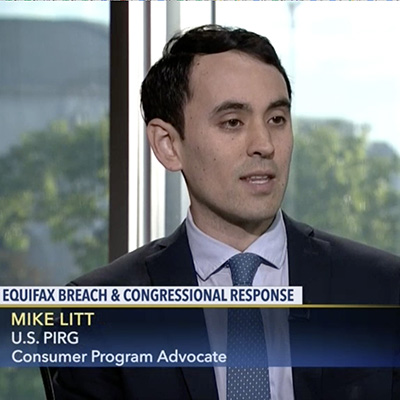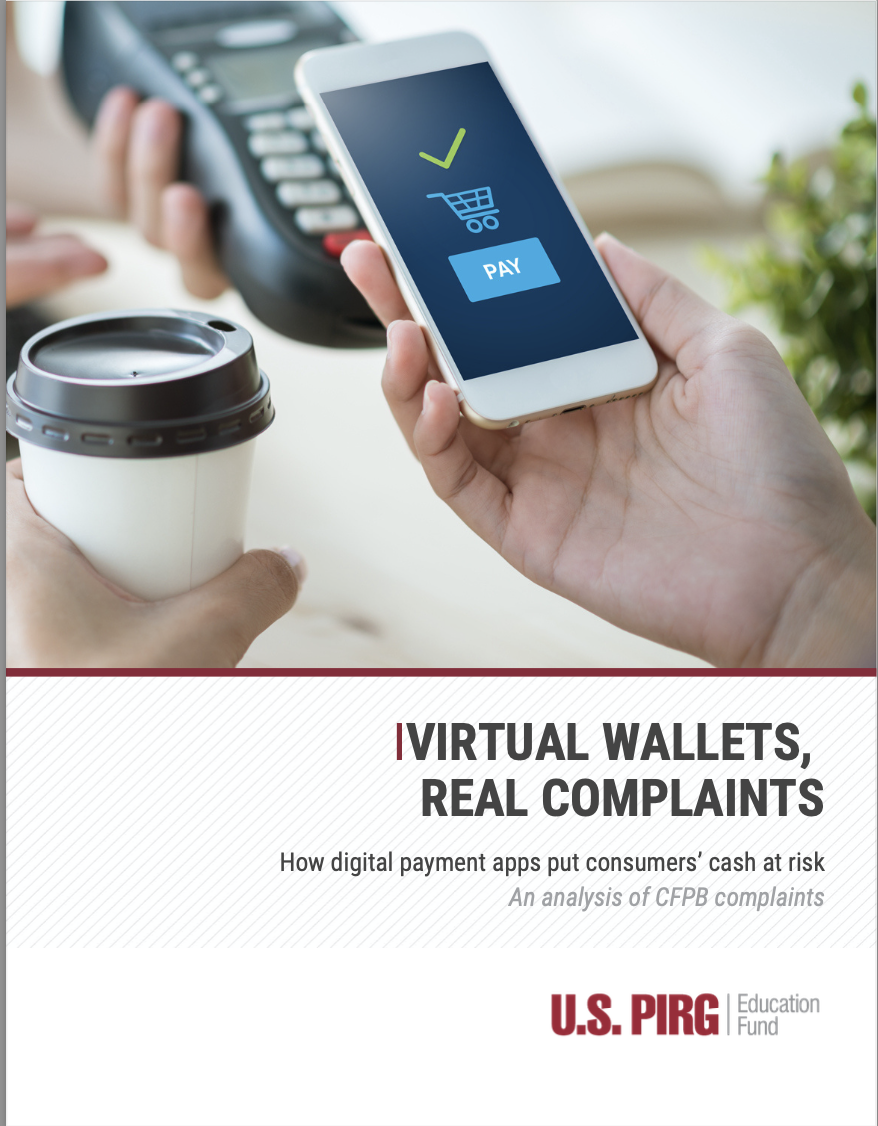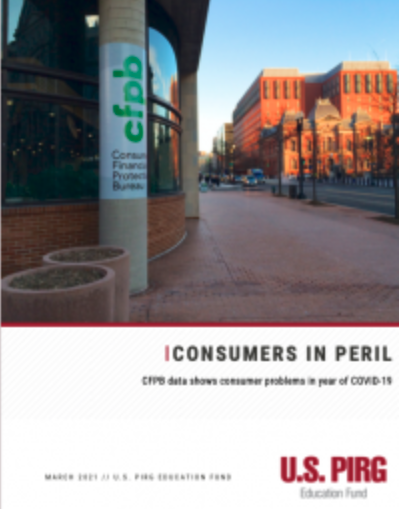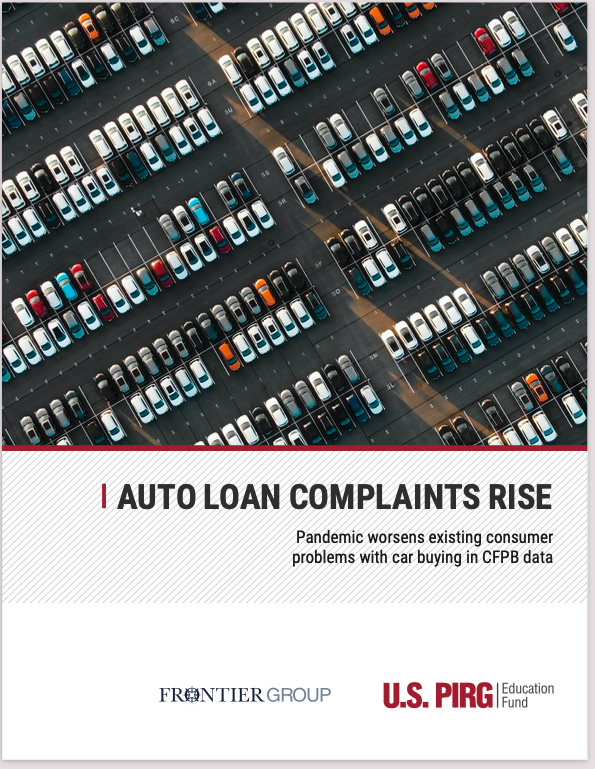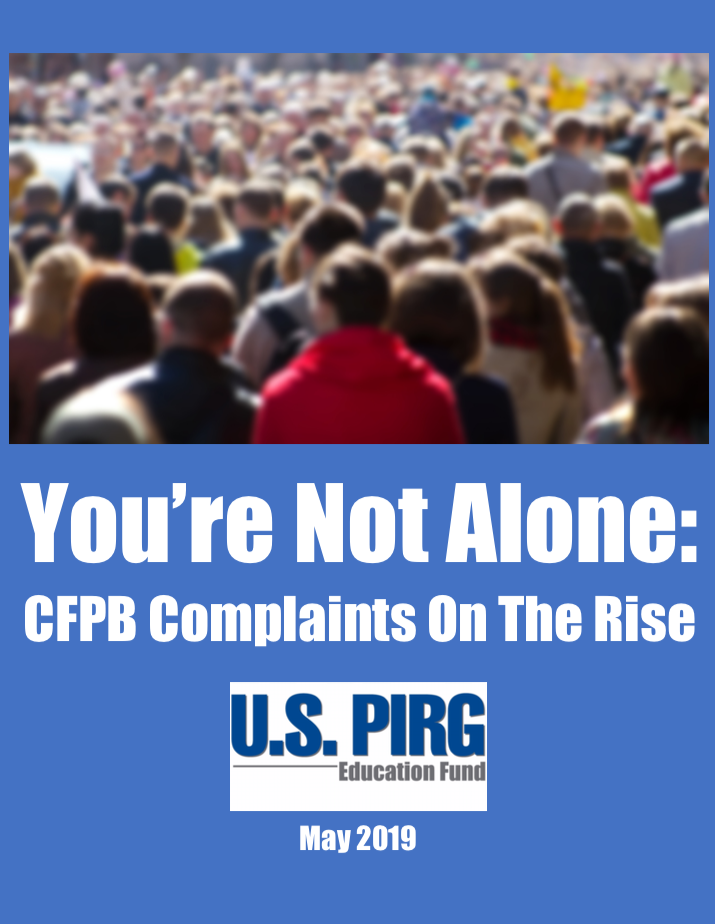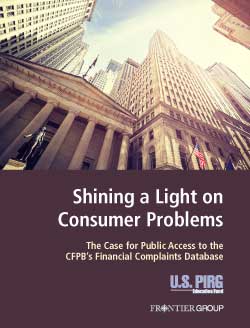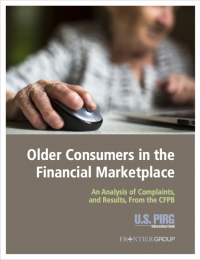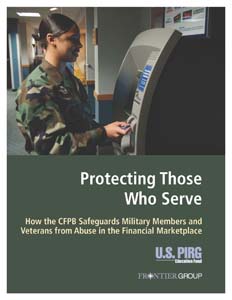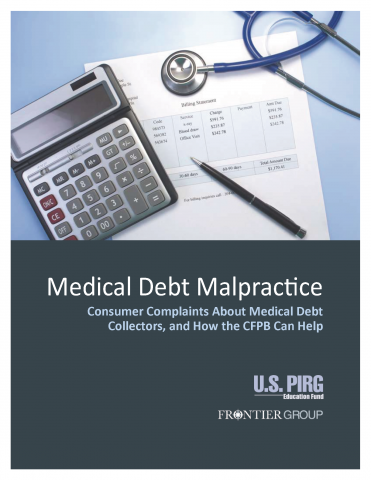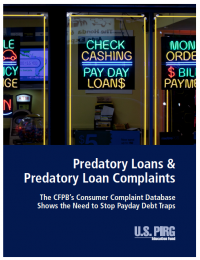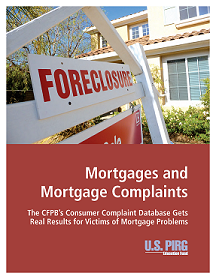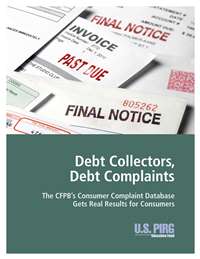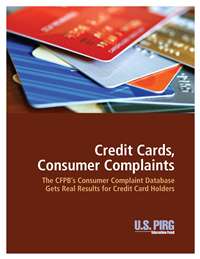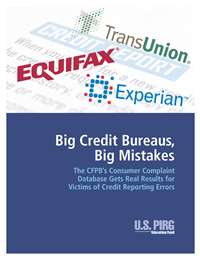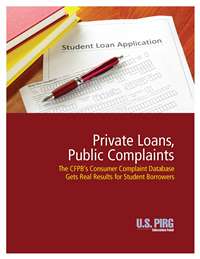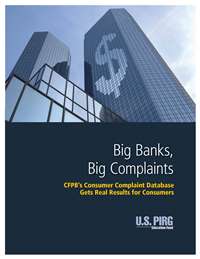
Reports: The CFPB Gets Results for Consumers
List of all reports derived from the CFPB public consumer complaint database
(Links to all reports below this short introduction.)
The mission of the Consumer Financial Protection Bureau (CFPB) is to identify dangerous and unfair financial practices, educate consumers about these practices, and regulate the financial institutions that perpetuate them.
To help accomplish these goals, the CFPB has created the public Consumer Complaint Database. The database tracks complaints made by consumers to the CFPB and how they are resolved. It enables the CFPB to identify financial practices that threaten to harm consumers and enables the public to evaluate both the performance of the financial industry and of the CFPB.
Our report series reviews complaints to the CFPB nationally and on a state-by-state level, with the aim of uncovering patterns in the problems consumers are experiencing with financial products and services. Numerous news outlets, including the Wall Street Journal, Huffington Post, and Today Money, have covered our research. This August 2016 blog entry offers a quick summary of recent improvements to the CFPB Complaint Database structure and its available information for consumers, researchers and competitors. In 2019, despite the best efforts of the previous acting director and CFPB’s innumerable financial industry opponents to eliminate the public-facing database, the current director Kathy Kraninger announced plans to keep it open to the public — following a long successful campaign by U.S. PIRG and allies (our statement).
March 2023: Big Credit Bureaus, Record Complaints
U.S. PIRG Education Fund reviewed data from the Consumer Financial Protection Bureau (CFPB) public consumer complaint database for 2021 and 2022 and found that the complaints concerning credit reports had nearly doubled in another record setting year: consumers filed a total of over 800,000 new complaints concerning all financial products.
|
|
March 2022: The Hidden Costs of Buy Now, Pay Later.U.S. PIRG Education Fund reviewed data from the Consumer Financial Protection Bureau (CFPB) and the Better Business Bureau (BBB) and found that the most common complaints about “Buy Now, Pay Later” plans include hidden fees, high interest rates and problems when it comes time for debt collection. BNPL was pioneered by Big Tech firms (see Virtual Wallets report below) and seems designed to make you buy more stuff you don’t need and can’t afford. BNPL needs to be brought fully under all consumer protecion laws. |
|
|
June 2021: Virtual Wallets, Real Complaints: How digital payment apps put consumers’ cash at risk.The latest U.S. Education Fund report delves into skyrocketing consumer complaints to CFPB about virtual wallets and payments apps such as Venmo, Cash App and Zelle. The three most commonly complained-about issues involving digital wallets are problems managing, opening or closing accounts; problems with fraud or scams; and problems with transactions (including unauthorized transactions).
|
|
|
March 2021: Consumers In Peril: CFPB data shows consumer problems in year of COVID-19.Our latest U.S. PIRG Education Fund report shows consumer complaints to the CFPB shattered records in 2020 as consumer finances were battered by the effects of the pandemic. The report found that more than half of all complaints in 2020 were against the Big Three credit bureaus. The report makes recommendations to Congress and the CFPB. |
|
|
October 2021: Auto Loan Complaints Rise: Pandemic worsens existing consumer problems with car buying in CFPB data.U.S. PIRG Education Fund and Frontier Group examination reveals a sharp spike in consumer complaints about auto purchasing, leasing and finance since the beginning of the pandemic. Fact sheet on report. Video blog on report. “Buying a Car?” Guide. |
|
Occasional Reports from the Pandemic |
Over the pandemic period, we’ve released a series of mini-reports and analyses documenting the new record number of complaints set each month during the pandemic and its impacts on homeowners, car owners, and other consumers.
A U.S. PIRG video conversation with former CFPB Director Rich Cordray on COVID response (including a 2-minute excerpt on the complaint database) (April 15, 2020). |
ConsumersFirst |
April 2020: Putting Consumers First: The Missing Voice In the CFPB’s Coronavirus Response, a joint report with the Student Borrower Protection Center (SBPC) and Consumer Action.Given the magnitude of the coronavirus pandemic, the CFPB needs to expand and enhance its consumer complaint system. We propose a number of changes to the Bureau’s complaint tool and public Consumer Complaint Database. These changes are urgently needed during the pandemic but many, such as the addition of small business complaints to the tool, should be made permanently. The report is accompanied by excerpts from consumer database narratives (stories). |
|
|
June 2019: You’re Not Alone: CFPB Complaints on the Rise:U.S. PIRG Education Fund examined all database complaints since inception in 2011. KEY FINDINGS: The CFPB has received more than 1.5 million complaints and published 1,197,145 of them as of January 14th, 2019. In 2018, the CFPB published more than 257,000 complaints, more than any previous year. We remain very concerned that if the CFPB takes the database dark and only publishes weak, occasional reports of its own, that consumers and the marketplace will be the losers and corporate wrongdoers the winners.
|
|
|
June 2018: Debt Collectors: CFPB Data Reveal Consumer Complaints By Company.U.S. PIRG Education Fund and Frontier Group examined a recent CFPB “snapshot” of debt collector complaints. We were disappointed it told us nothing about which were the the most-complained about debt collectors and what characteristics they had. So we did our own report, based on the public database. We remain very concerned that if the CFPB takes the database dark and only publishes weak, occasional reports of its own, that consumers and the marketplace will be the losers and corporate wrongdoers the winners. |
|
|
June 2018: Shining a Light On Consumer Problems: The Case for Public Access to the CFPB’s Financial Complaints Database.The CFPB’s Consumer Complaint Database has been public since it was established in 2012. Why take it dark? That would only aid corporate wrongdoers. U.S. PIRG and Frontier Group examine the many reasons that keeping the database public helps consumers, makes government more transparent to rsearchers, allows competitors to avoid practices that create complaints for others, and makes the marketplace work better. |
|
|
October 2017: Older Consumers in the Financial Marketplace: An Analysis of Complaints, and Results, From the CFPB.Congress created in the Consumer Bureau an Office of Older Americans, to look after these frequent targets of financial schemes. This report analyzed all complaints with a voluntary “older” tag (meaning complainant says age is >62). A two page summary fact sheet from the report is available. |
|
|
June 2017: Protecting Those Who Serve: How the CFPB Safeguards Military Members and Veterans from Abuse in the Financial Marketplace.Congress created in the CFPB an Office of Servicemember Affairs to ensure that servicemembers, veterans and their families had a watchdog against financial predators, including some that “line up like bears on a trout stream outside military bases.” This report examines 44,000 complaints from servicemembers and also explains that the CFPB’s work is doubly-critical because financial problems lead to revoked security clearances, which harms unit preparedness. A two page summary fact sheet from the report is available. |
|
|
April 2017: Medical Debt Malpractice: Consumer Complaints About Medical Debt Collectors, and How the CFPB Can Help.This report drills down into 17,701 medical debt collection complaints to the CFPB. Key finding: 63% of complaints were about debt never owed, debt no longer owed or discharged in bankruptcy, or never verified as belonging to that consumer. We also published a two-page fact sheet summarizing the report. |
|
|
December 2016: Big Banks, Big Overdraft Fees.This report combines data from the CFPB Consumer Complaint Database with additional data on big bank (>$1 Billion in assets) overdraft fee income required to be filed quarterly with the Federal Financial Institutions Examination Council (FFIEC). It finds a statistically valid correlation: banks that depend on overdraft fee revenue have more complaints to the CFPB. |
|
|
August 2016: Predatory Loans and Predatory Loan Complaintsreviewed complaints about high-cost short-term small dollar (payday) loans and related high-cost installment loans using your paycheck as collateral, as well as similar loans using your auto title as collateral. The report also explains the history of payday lending regulation and analyzes a draft high-cost lending rule from the CFPB. |
|
|
July 2015: Mortgages and Mortgage Complaintsreviewed complaints about mortgages and heralded the CFPB’s recent (June 2015) inclusion, on a voluntary basis, of consumer narratives (stories) in the database going forward. |
|
|
February 2014: “Debt Collectors, Debt Complaints”reviewed complaints about debt collectors. Read more here. |
|
|
January 2014: “Credit Cards, Consumer Complaints”reviewed complaints about credit cards. Read more here. |
|
|
November 2013: “Big Credit Bureaus, Big Mistakes”reviewed complaints about credit reporting. Read more here. |
|
|
October 2013: “Private Loans, Public Complaints”reviewed complaints about private student loans. Read more here. |
|
|
September 2013: “Big Banks, Big Complaints”reviewed complaints aboutbank accounts and services. Read more here. |

To file a complaint with the CFPB, visit the complaint portal at
www.consumerfinance.gov/complaint.
To review complaints other consumers have made to the CFPB, visit
the public Consumer Complaints Database at
www.consumerfinance.gov/complaintdatabase.
Topics
Authors
Ed Mierzwinski
Senior Director, Federal Consumer Program, U.S. PIRG Education Fund
Ed oversees U.S. PIRG’s federal consumer program, helping to lead national efforts to improve consumer credit reporting laws, identity theft protections, product safety regulations and more. Ed is co-founder and continuing leader of the coalition, Americans For Financial Reform, which fought for the Dodd-Frank Wall Street Reform and Consumer Protection Act of 2010, including as its centerpiece the Consumer Financial Protection Bureau. He was awarded the Consumer Federation of America's Esther Peterson Consumer Service Award in 2006, Privacy International's Brandeis Award in 2003, and numerous annual "Top Lobbyist" awards from The Hill and other outlets. Ed lives in Virginia, and on weekends he enjoys biking with friends on the many local bicycle trails.
Mike Litt
Director, Consumer Campaign, U.S. PIRG Education Fund
Mike directs U.S. PIRG’s national campaign to protect consumers on Wall Street and in the financial marketplace by defending the Consumer Financial Protection Bureau, and works for stronger privacy protections and corporate accountability in the wake of the Equifax data breach. Mike lives in Washington, D.C.
Find Out More

Safe At Home in 2024?

What the California Consumer Privacy Act means for you

What the New Jersey Privacy Act means for you


